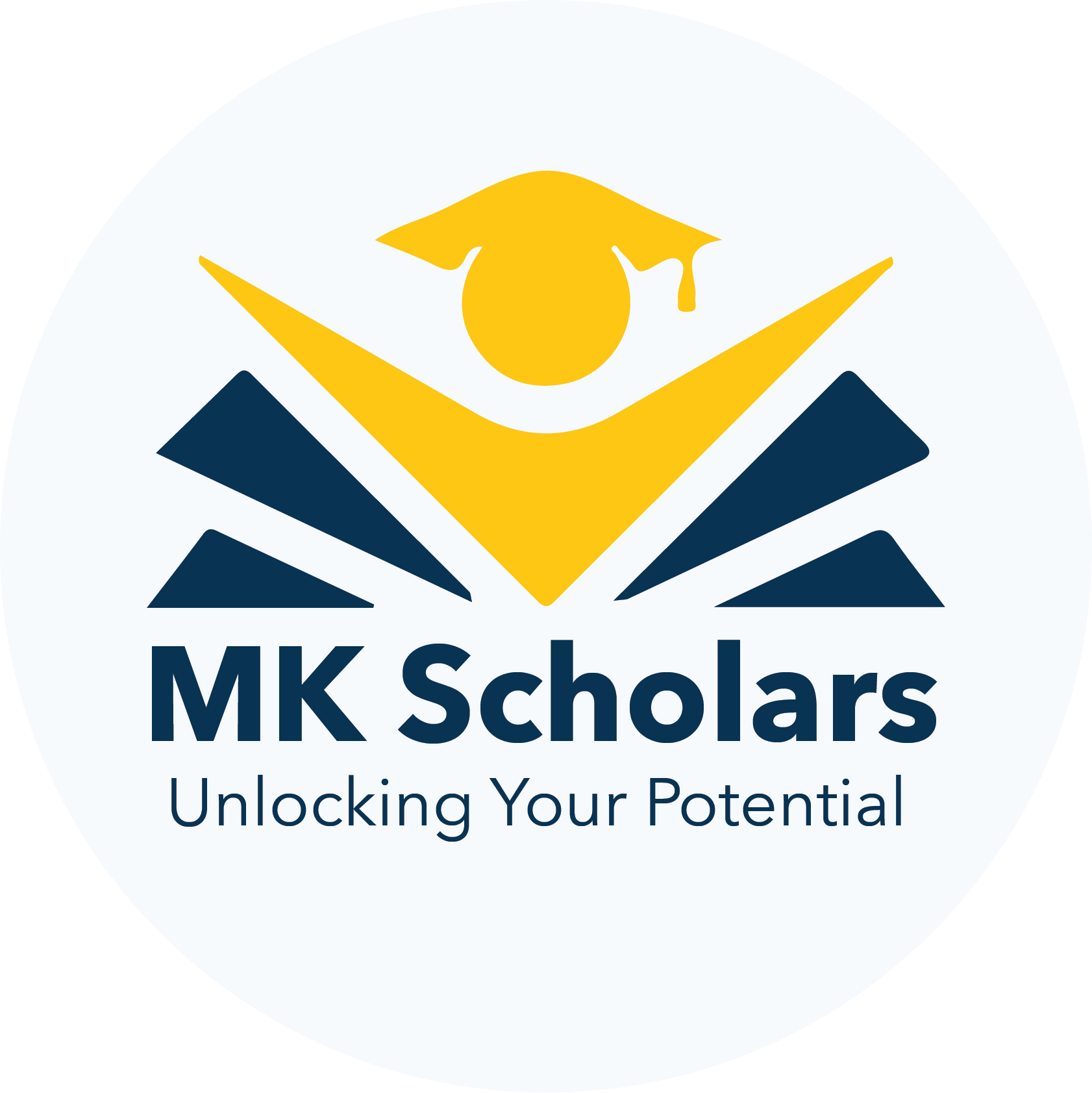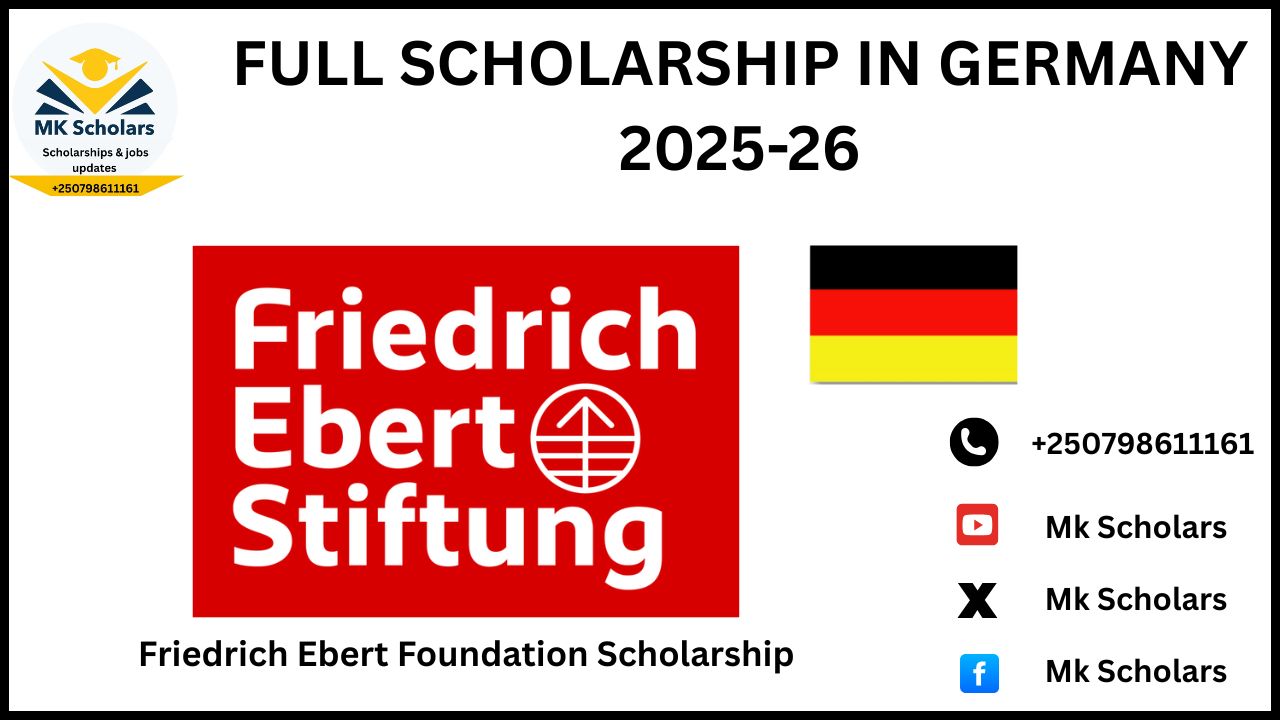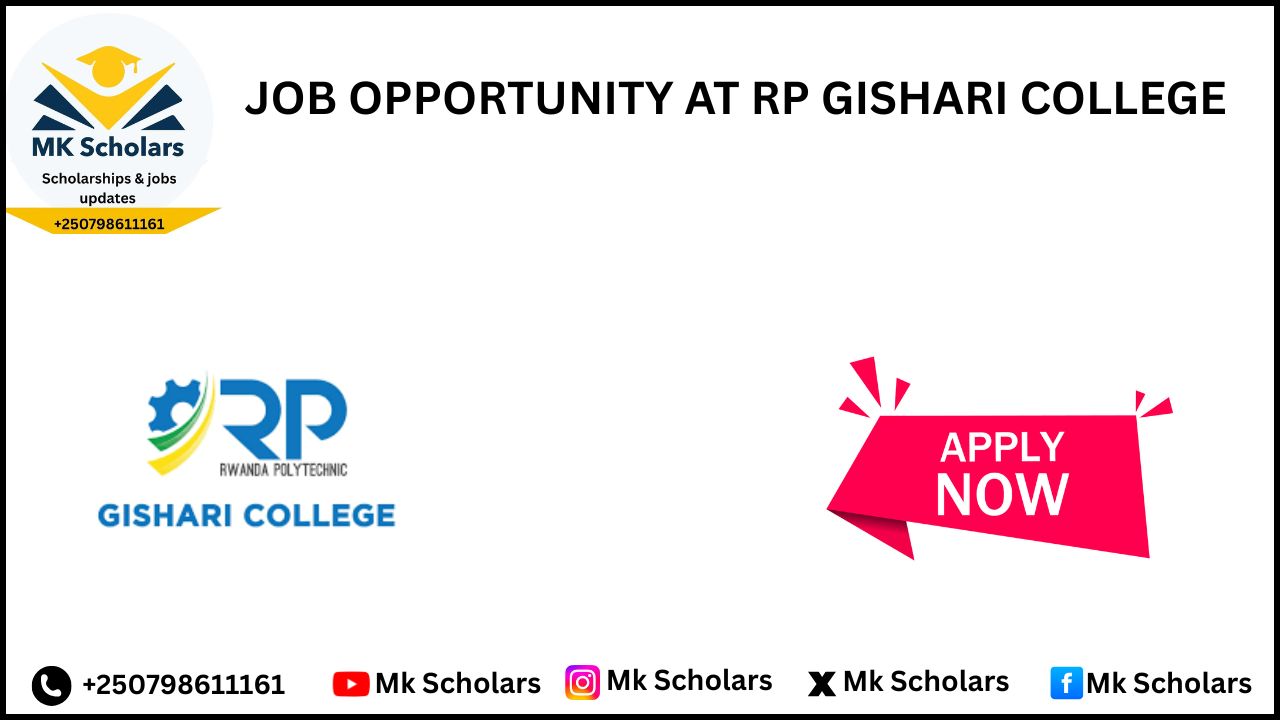New Program
MK Driving School
We're thrilled to announce the launch of our new MK Driving School!
What We Offer
- Professional driving training
- Theory exam preparation (Provisoire)
- Real past exam questions and answers
- Study smarter and faster
- Pass the first time
Learn. Practice. Pass.

FULL SCHOLARSHIP IN GERMANY 2025-2026
- Home
- /
- More
FULL SCHOLARSHIP IN GERMANY 2025-2026

The Friedrich Ebert Foundation (FES) Scholarship 2025–26 in Germany offers a prestigious, fully funded opportunity for highly motivated international students committed to social justice and academic excellence. This scholarship supports students at various levels Bachelor’s, Master’s, and PhD across all academic disciplines. Alongside generous financial support, recipients benefit from access to seminars, mentoring programs, and a broad professional network, helping them grow as future leaders in their fields.
The scholarship is offered by the Friedrich-Ebert-Stiftung, a renowned German political foundation committed to promoting democracy, political education, and international cooperation. Founded in 1925 and affiliated with the Social Democratic Party of Germany (SPD), the foundation partners with universities across Germany, enabling recipients to study at any state-recognized institution. Its emphasis on academic merit, social engagement, and democratic values makes it one of the most impactful and respected scholarship programs in Europe. 📚 Register now for Coding and English Language classes at MK SCHOLARS. July intake is starting on 10th
SCHOLARSHIP BENEFITS :
• Funding available for Bachelor's, Master's, and PhD studies.
• Open to all fields of study at state-recognized universities in Germany.
• Access to seminars, workshops, and personal mentoring.
• Monthly Stipend:
o Undergraduate/Master’s students: up to €934/month
o PhD students: up to €1,550/month + €100 research allowance
• Health insurance costs fully covered.
• Family allowance: up to €276/month for scholars with children.
• No repayment required (non-refundable scholarship).
• Language course funding (especially for German).
ELIGIBILITY CRITERIA:
1. Admission to a German University.
o Must be enrolled or have an admission letter from a state-recognized university in Germany.
2. Academic Performance
o Must have above-average grades in previous studies.
3. Study Program Timing
o For Bachelor/Master: apply early (before or during first semester).
o For PhD: apply before submitting your dissertation.
o Medicine students: apply after 4th semester and before the 6th ends.
4. Language Proficiency.
o Must have very good German language skills (e.g., DSH-2, TestDaF 4, Telc C1 Hochschule, Goethe-Zertifikat C1).
5. Social or Political Engagement.
o Must show active involvement in community, politics, NGOs, student councils, unions, youth groups, etc.
6. Support for Social Democratic Values
o Must support the values of the foundation: freedom, justice, and solidarity.
7. Nationality
o Open to both Germans and international students (especially from Global South countries like Africa, Asia, Latin America, and Eastern Europe).
o Also open to refugees living in Germany.
8. No Double Funding
o Cannot receive another scholarship funded by the German government (e.g., DAAD, Studienstiftung).
9. Field of Study
o All fields are welcome, except PhD applicants in medicine.
10. Motivation and Personality
• Must demonstrate personal motivation, social responsibility, and alignment with the foundation’s goals.
AVAILABLE PROGRAMS:
The FES Scholarship supports students across all academic disciplines, including:
• Natural Sciences
• Engineering
• Social Sciences
• Humanities
• Arts and Design
• Law
• Economics
• Health Sciences
• Political Science
• Education
• Environmental Studies
• Computer Science
• Business Administration
• Agricultural Sciences
• Architecture and Urban Planning
• Media and Communication
• Psychology
• International Relations
• Sociology
• Philosophy
• Linguistics
• History
• Geography
• Mathematics
• Physics
• Chemistry
• Biology
• Veterinary Medicine
• Agricultural Engineering
• Public Health
• Nursing
• Pharmacy
• Dentistry
• Sports Science
• Music and Performing Arts
• Fine Arts
• Fashion Design
• Culinary Arts
• Tourism and Hospitality
• Urban Studies
• Gender Studies
• Peace and Conflict Studies
• Development Studies
• Public Policy
• Digital Media
• Artificial Intelligence
• Robotics
• Cybersecurity
• Blockchain Technology
• Data Science
• Machine Learning
• Bioinformatics
• Nanotechnology
• Renewable Energy
• Climate Change Studies
• Sustainable Development
• Water Resources Management
• Disaster Management
• Logistics and Supply Chain Management
• Public Administration
• Criminal Justice
• Forensic Science
• Social Work
• Library and Information Science
• Museum Studies
• Cultural Heritage Management
• Translation and Interpretation
• Applied Linguistics
• TESOL (Teaching English to Speakers of Other Languages)
• TESL (Teaching English as a Second Language)
• TEFL (Teaching English as a Foreign Language)
• TESP (Teaching English for Specific Purposes)
• TESL (Teaching English as a Second Language)
• TESOL (Teaching English to Speakers of Other Languages)
• TEFL (Teaching English as a Foreign Language)
• TESP (Teaching English for Specific Purposes)
• TESL (Teaching English as a Second Language)
• TESOL (Teaching English to Speakers of Other Languages)
• TEFL (Teaching English as a Foreign Language)
• TESP (Teaching English for Specific Purposes)
• TESL (Teaching English as a Second Language)
• TESOL (Teaching English to Speakers of Other Languages)
• TEFL (Teaching English as a Foreign Language)
• TESP (Teaching English for Specific Purposes)
• TESL (Teaching English as a Second Language)
• TESOL (Teaching English to Speakers of Other Languages)
• TEFL (Teaching English as a Foreign Language)
• TESP (Teaching English for Specific Purposes)
• TESL (Teaching English as a Second Language)
• TESOL (Teaching English to Speakers of Other Languages)
• TEFL (Teaching English as a Foreign Language)
• TESP (Teaching English for Specific Purposes)
• TESL (Teaching English as a Second Language)
• TESOL (Teaching English to Speakers of Other Languages)
• TEFL (Teaching English as a Foreign Language)
• TESP (Teaching English for Specific Purposes)
• TESL (Teaching English as a Second Language)
• TESOL (Teaching English to Speakers of Other Languages)
• TEFL (Teaching English as a Foreign Language)
• TESP (Teaching English for Specific Purposes)
• TESL (Teaching English as a Second Language)
• TESOL (Teaching English to Speakers of Other Languages)
• TEFL (Teaching English as a Foreign Language)
• TESP (Teaching English for Specific Purposes)
• TESL (Teaching English as a Second Language)
• TESOL (Teaching English to Speakers of Other Languages)
• TEFL (Teaching English as a Foreign Language)
• TESP (Teaching English for Specific Purposes)
• TESL (Teaching English as a Second Language)
• TESOL (Teaching English to Speakers of Other Languages)
• TEFL (Teaching English as a Foreign Language)
• TESP (Teaching English for Specific Purposes)
• TESL (Teaching English as a Second Language)
• TESOL (Teaching English to Speakers of Other Languages)
• TEFL (Teaching English as a Foreign Language)
• TESP (Teaching English for Specific Purposes)
• TESL (Teaching English as a Second Language)
• TESOL (Teaching English to Speakers of Other Languages)
• TEFL (Teaching English as a Foreign Language)
• TESP (Teaching English for Specific Purposes)
• TESL (Teaching English as a Second Language)
• TESOL (Teaching English to Speakers of Other Languages)
• TEFL (Teaching English as a Foreign Language)
• TESP (Teaching English for Specific Purposes)
• TESL (Teaching English as a Second Language)
• TESOL (Teaching English to Speakers of Other Languages)
• TEFL (Teaching English as a Foreign Language)
• TESP (Teaching English for Specific Purposes)
• TESL (Teaching English as a Second Language)
• TESOL (Teaching English to Speakers of Other Languages)
• TEFL (Teaching English as a Foreign Language)
• TESP (Teaching English for Specific Purposes)
• TESL (Teaching English as a Second Language)
• TESOL (Teaching English to Speakers of Other Languages)
• TEFL (Teaching English as a Foreign Language)
• TESP (Teaching English for Specific Purposes)
• TESL (Teaching English as a Second Language)
• TESOL (Teaching English to Speakers of Other Languages)
• TEFL (Teaching English as a Foreign Language)
• TESP (Teaching English for Specific Purposes)
• TESL (Teaching English as a Second Language)
• TESOL (Teaching English to Speakers of Other Languages)
• TEFL (Teaching English as a Foreign Language)
REQUIRED DOCUMENTS:
1 . Letter of Motivation.
• Explaining your academic and personal goals, why you want this scholarship, and how you relate to FES values.
2. Curriculum Vitae (CV).
• Detailed resume including education, work experience, social/political engagement, and skills.
3. Proof of Admission or Enrollment.
• Admission letter or certificate of enrollment from a recognized German university.
4. Academic Transcripts.
• Recent and previous academic records showing your grades.
5. Language Proficiency Certificates.
• Proof of German language skills (e.g., DSH 2, TestDaF 4, Goethe-Zertifikat C1), even if studying in English.
6. Letters of Recommendation.
• Usually two letters from professors, employers, or supervisors who can attest to your academic abilities and character.
7. Proof of Social/Political Engagement.
• Evidence of your involvement in community, politics, NGOs, unions, student organizations, etc.
8. Copy of Passport or ID.
• Valid identification document.
9. Project Proposal or Research Plan.
• For PhD applicants, a synopsis of your intended research or project.
APPLICATION PROCEDURES:
1. Check Eligibility.
• Confirm you meet all eligibility criteria for the scholarship.
2. Prepare Required Documents.
• Gather all necessary documents such as application form, motivation letter, CV, transcripts, language certificates, recommendation letters, etc.
3. Complete the Online Application.
• Fill out the official FES scholarship application form on their website.
4. Submit Application.
• Upload all required documents through the online portal before the deadline.
5. Initial Screening.
• Your application will be reviewed for completeness and eligibility.
6. First Interview.
• If shortlisted, you’ll be invited for an interview with a university faculty member (often called the “vertrauensdozent”).
7. Second Interview • Successful candidates from the first interview will be invited for a final selection interview with the FES scholarship committee. 8. Notification of Results.
• Selected scholarship recipients will be informed via email or official communication.
9. Scholarship Agreement.
• Successful applicants sign an agreement outlining rights and responsibilities.
10. Start of Scholarship Period.
• Begin receiving scholarship support as per the academic calendar.
ADDITIONAL INFORMATION:
• Students with difficult backgrounds are encouraged to apply.
• Travel money may be given for conferences or research.
• Health insurance is included.
📚 Register now for Coding and English Language classes at MK SCHOLARS. July intake is starting on 10th
APPLICATION DEADLINE:
1.Master’s and Bachelor’s Programs:
• Apply by April 30, 2025 for Summer Semester
• Apply by October 31, 2025 for Winter Semester
2. Medical Students:
• Usually only students already studying in Germany after 4th semester can apply, so if you’re not in Germany yet, you likely have to wait until you start studying there.
3. PhD Programs:
• Apply anytime before you submit your dissertation, ideally 1–2 years before.
#Scholarshipapplications #Mkscholars #FriedrichEbertFoundationScholarships #GermanyScholarships
Application process guiding videos
500+ FULLY FUNDED SCHOLARSHIPS IN USA, CANADA, FRANCE, UK, SCOTLAND || LEARN MORE HOW TO APPLY
MASTERCARD FULL SCHOLARSHIP IN SOUTH AFRICA: STEPS-BY-STEPS TO APPLY & TIPS TO WIN SCHOLARSHIP.
Recently Uploaded
-
.jpg) JOB OPPORTUNITY AT RP KIGALI 2026-01-24
JOB OPPORTUNITY AT RP KIGALI 2026-01-24 -
.jpg) JOB OPPORTUNITY AT RDB 2026-01-24
JOB OPPORTUNITY AT RDB 2026-01-24 -
.jpg) JOB OPPORTUNITY AT RUHANGO DISTRICT 2026-01-23
JOB OPPORTUNITY AT RUHANGO DISTRICT 2026-01-23 -
.jpg) HEC FULL SCHOLARSHIP IN EGYPT 2026-01-23
HEC FULL SCHOLARSHIP IN EGYPT 2026-01-23 -
.jpg)
-
.jpg) BRAZIL-RWANDA GOVERNMENT SCHOLARSHIPS 2026-01-20
BRAZIL-RWANDA GOVERNMENT SCHOLARSHIPS 2026-01-20 -
 JOB OPPORTUNITY AT RP GISHARI COLLEGE 2026-01-20
JOB OPPORTUNITY AT RP GISHARI COLLEGE 2026-01-20
Need Help with FULL SCHOLARSHIP IN GERMANY 2025-2026?
Our team is here to guide you through the entire application process. Get personalized assistance and increase your chances of success!